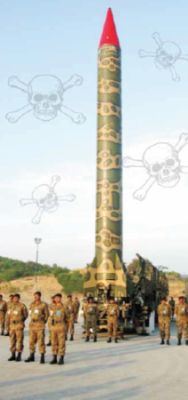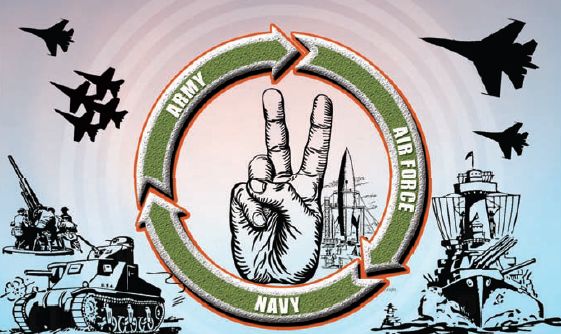The Pakistani nuclear doctrine, at least our knowledge of it, is today based on an interview given by Lt General Khalid Kidwai (retd), Director General of Pakistan’s Strategic Plans Division to Paolo Cotta-Rassmussen and Maurizio Martinelli published by Pugwash International in 2002. There is, however, as has been noted elsewhere, a difference between a ‘declaratory’ doctrine and an operational one; the latter can only be deduced from the information available on acquisitions and capabilities, statements of policy by albeit retired senior military men from Pakistan and such Western sources, presumably from intelligence inputs. On the basis of these, it would appear that Pakistan has adopted a policy of battlefield use of its nuclear weapons, a likely escalation of a conventional confrontation to a nuclear level, arrangements for rapid deployment which could entail predelegation to unit commanders in the event of a loss of communications, (which is what apparently happened at Salala recently when 24 Pakistani soldiers were killed in an ISAF air attack on two border posts) and increasing risks of inadvertent or accidental launch. Ashley Tellis in his 2000 book on India’s Emerging Nuclear Posture has written of the ‘uncertainties’ which arise from “The severe motivational and cognitive biases that have historically afflicted Pakistan’s higher decision making institutions on matters of war and peace (which) raise fears about the prospect of extreme responses that might be precipitated in a crisis … These failures of rationality … could be compounded by exigencies of domestic politics, civil-military discord and biased and unreliable intelligence … ”This posture is one which appears to be based on the assumption that India will not permit the situation to escalate, by considering a limited and targeted use of, for example, air strikes.
Non-state actors
At another level, non-state groups could be used either to provoke a military response from India, or, more dangerously, nuclear material could become available to these groups through theft or through insider linkages. The attack on Pakistan’s Mehran naval base was apparently enabled by insider collusion. At the same time the already friable situation could be exacerbated to intolerable levels if the state itself, following the trends within Pakistani society, becomes a theocratic intolerant state, bent on the establishment of a Caliphate in the region. The military and non-state groups are certain to have been emboldened by India having been ‘deterred’ in 1999, following the Kargil attack, in 2001 after the attack on Parliament and Operation Parakram and more so, after 2008, after the attack on Mumbai. Would India react differently in the event of another Mumbai-type attack?
 |
There is a need to slightly tweak our nuclear doctrine; the objective would be not to change our No First Use policy, but to revert to the language of the Draft doctrine on the question of retaliatory strikes — these should be ‘punitive’ rather than ‘massive’ as now exists. Massive retaliation would imply counter-value strikes and would lead to incorrect assumptions on the part of the adversary, whereas a punitive strike would retain the flexibility of options. In addition, in order to disillusion the adversary of our intent to retaliate, the control of the weapons should be placed squarely with the Strategic Forces Command
There is no doubt that the current dialogue with Pakistan helps us to buy some time, though given the political instability in Pakistan and the split polity in India, the chances of it being sustainable or effective remain slight unless other signals are sent. There is a need to use this time to formulate other tools to reinforce the message behind the talks; a need for example, to start serious discussions with Pakistan on nuclear doctrines. It will be more difficult to get this accepted by the Pakistanis, particularly as the Pakistani military is at the moment more preoccupied with consolidating its somewhat frayed image within the country and dealing with the immediate challenges of dealing with the US and Pakistan’s ambitions in Afghanistan. Nonetheless this objective has to be followed with persistence and patience, with as much importance given to this objective as to our overall military preparedness. So far, there have been some discussions on nuclear CBMs with Pakistan, mainly at the Track II level, but they have been over-modest efforts and at the official level, the steps have been faltering and weak. Pakistan sees its nuclear weapons not only as essential to their security but as their ‘crown jewels’ almost as a symbol of their nationhood. Without disputing their possession of these weapons, however, an increase in efforts to prevent any nuclear misadventure is urgent. At the same time, discussions on nuclear issues with China too, need to be started and again it will be a difficult task. The discussions need to be at high political levels or even with trusted back channels. Some Track II discussions have indeed taken place with China, but they remain sporadic and with little substance or follow-up.
Retribution
Within our own establishment, there is a need to slightly tweak our nuclear doctrine; the objective would be not to change our No First Use policy, but to revert to the language of the Draft doctrine on the question of retaliatory strikes — these should be ‘punitive’ rather than ‘massive’ as now exists. Massive retaliation would imply counter-value strikes and would lead to incorrect assumptions on the part of the adversary, whereas a punitive strike would retain the flexibility of options. In addition, in order to disillusion the adversary of our intent to retaliate, the control of the weapons should be placed squarely with the Strategic Forces Command. The Pakistani and Chinese militaries have the ‘advantage’ of greater coherence and congruence in their weapons policies, as the military is in full control of the nuclear weapons programme, whereas our weapons remain under civil control even while the delivery vehicles may be with the military.
India is perhaps the only country that faces — or has ever faced — the challenges arising from having two nuclear neighbours, who closely cooperate with each others’ nuclear programmes and who maintain adversarial relations with her
To emphasise, these are signals to the adversary in this interim period, without any other change in our nuclear posture. There are bound to be many who will see this as too hawkish and too dangerous; they should then propose less dangerous methods of signalling. Others might see it as too little in terms of preparedness for retaliation, but the hope is to try and avoid the necessity of nuclear retaliation. The ultimate objective must always be to ensure that the chances of adversarial nuclear incidents are minimised and that nuclear weapons are never actually used in a war.
The already friable situation could be exacerbated to intolerable levels if the state itself, following the trends within Pakistani society, becomes a theocratic intolerant state, bent on the establishment of a Caliphate in the region. The military and non-state groups are certain to have been emboldened by India having been ‘deterred’ in 1999, following the Kargil attack, in 2001 after the attack on Parliament and Operation Parakram and more so, after 2008, after the attack on Mumbai. Would India react differently in the event of another Mumbai-type attack?
About the Author
Amb Arundhati Ghosh
The writer joined the Indian Foreign Service in 1963 and served in various capacities in the Ministry of External Affairs and in Indian missions abroad. She was incharge of economic relations when economic reforms were launched in 1991. Served in the Branch Secretariat of the Ministry to liaise with the Bangladesh Government — in — exile in Calcutta during the birthpangs of that nation-state. Served as Ambassador in Egypt, South Korea and as Permanent Representative to UNESCO and to the UN Offices in Geneva. As Ambassador to the Conference on Disarmament in Geneva she etched in indelible words the sovereign resolve of the Indian nation never to sign the Comprehensive Test Ban Treaty (CTBT). Her words reverberate in Indian hearts to this day. She told the world in measured, authoritative tones that India would never sign the CTBT. “Not now! Not ever!”.
Defence and Security Alert (DSA
Defence and Security Alert (DSA) magazine is the only ISO 9001:2008 certified, premier world class, new wave monthly magazine which features paradigm changing in-depth analyses on defence, security, safety and surveillance, focusing on developing and strategic future scenarios in India and around the world.

 von
von 
